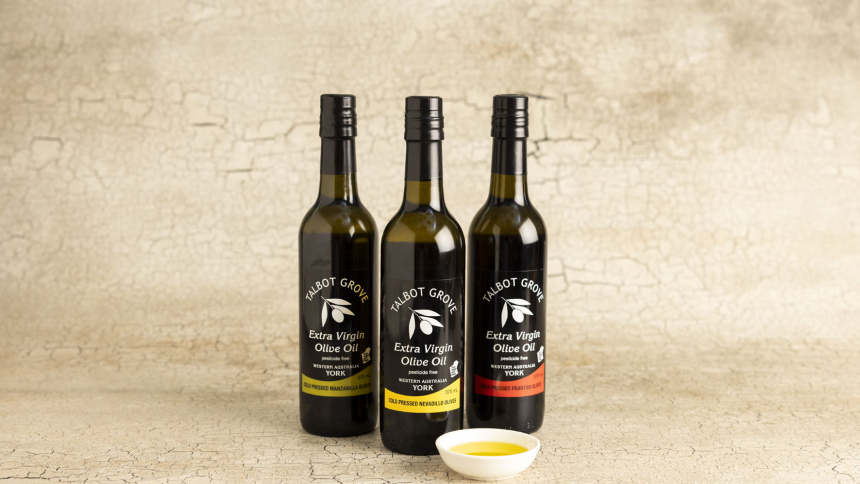
More than 20 million tonnes of olive oil are produced around the world each year, mostly in Mediterranean countries. With olives thriving in climates with cool winters and warm, dry summers, Western Australia also produces some mighty fine liquid gold across five growing regions, from as far south as Esperance up to the Mid West.
There are more than 1.5 million olive trees in production, with Koorian Farming in Gingin and Talbot Grove in York among the award-winning locals. Jingilli EVOO, which has groves in Frankland River and Moore River, even exports to Spain and Italy. Here’s a few more things you might not know about the good oil.
Olive oil is a plant-based oil made from fruit.
- Olive oil is extracted from pressed olives, the fruit of olea europaea, so it’s literally a fruit juice. Most other common oils, such as sunflower, corn, rice bran and grapeseed, start their lives as seeds.
- To ensure the best quality oil, olives should be pressed the day they are harvested – this prevents the fruit from deteriorating and captures the best flavours.
- You need to press a lot of olives (about 4 or 5kg) to get just one litre of oil, so think about that next time you bemoan the cost of extra virgin olive oil (EVOO).
- There are hundreds of varieties of olives, with some better suited than others to producing more oil. Picual is the number one olive in Spain, which also produces the most olive oil in the world.
- Great Southern Groves use Leccino, Frantoio and Pendolino in their oils. Talbot Grove also use Manzanilla and Nevadillo, while Fini Olives grow 11 different varieties of olives, including Picholine and Picual.
Not all olive oils are created equal.
- EVOO is the highest quality olive oil. Made from cold-pressing whole olives without additional heat or chemicals, it is packed with flavour and nutrients. It doesn’t age like fine wine – generally speaking, the younger it is the better it will taste.
- Pure, light or extra light olive oils (read labels carefully so you know what you are getting) are more refined, meaning they are more processed. They are often blended with some EVOO to give them colour.
- The more refined olive oils have a neutral taste and are often used for frying because of their higher smoking point. They are also often cheaper, so if you are watching your budget, keep EVOO for dressings and baking and use the less expensive olive oil for frying.
- Colour isn’t necessarily a sign of quality. The type of olive used, as well as where it is grown and when it is harvested, can determine whether your favourite EVOO is clear yellow, green or somewhere in between.
Olive oil has been loved for thousands of years.
- Olive oil production is believed to date back to 4000BC, with Crete, Turkey and Ancient Greece early consumers of the olive juice.
- It has been used in many ways over time, including as fuel, soap, skin lotion, detergent, preservatives and perfumes, even as a contraceptive.
- Olive trees take a while to mature (anywhere between five and 12 years) but they can live for hundreds of years. The amount of olives they produce over time will decline but you can be guaranteed oil for several generations.
Extra virgin olive oil is packed with nutrients.
- The less refined the oil the more nutrients it contains. EVOO is packed with antioxidants not found in other oils.
- It’s also a source of monounsaturated fat, the so-called ‘good’ fat that can help reduce the risk of heart and cardiovascular diseases.
- Greeks consume by far the most olive oil (about six litres each a year) and are among the healthiest people on Earth.
- Researchers interested in the lower instances of cancer among those who follow the Mediterranean diet have found anti-cancer properties in EVOO. It has also been linked to lower blood pressure.
Olive oil is one of the most versatile ingredients.
- Keep a bottle or two of olive oil in your pantry for everyday cooking. Use it in pasta sauces, such as this lovely lobster dish, or to make a marinade such as for this whole roasted herby fish.
- Don’t have any dressing? You can simply drizzle a little over salads as is, or use as the basis for a viniagrette or dressing for a fattoush salad.
- Use instead of butter when baking cakes and muffins. You need less than the butter specified (about half) to create a moist, longer lasting treat.
- Olive oil also pairs beautifully with other ingredients, which is why good quality infused oils, such as The Sathya Olive Company’s lemongrass and ginger or chilli and garlic oils, are so popular.
- We don’t suggest wasting expensive EVOO but it’s also great for fixing squeaky doors in a pinch. Just rub a little on the hinges.
If you want to know more about the olive industry in WA, check out Olives WA’s website – it’s the peak body for local olive growers and producers in the State.